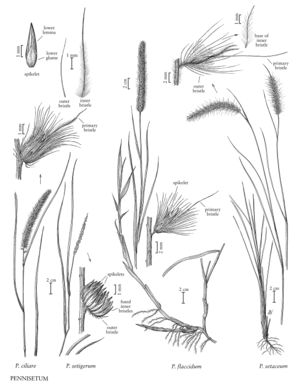Difference between revisions of "Pennisetum flaccidum"
imported>Volume Importer |
imported>Volume Importer |
||
| Line 37: | Line 37: | ||
|publication year= | |publication year= | ||
|special status= | |special status= | ||
| − | |source xml=https://bitbucket.org/aafc-mbb/fna-data-curation/src/ | + | |source xml=https://bitbucket.org/aafc-mbb/fna-data-curation/src/200273ad09963decb8fc72550212de541d86569d/coarse_grained_fna_xml/V25/V25_1365.xml |
|subfamily=Poaceae subfam. Panicoideae | |subfamily=Poaceae subfam. Panicoideae | ||
|tribe=Poaceae tribe Paniceae | |tribe=Poaceae tribe Paniceae | ||
Latest revision as of 17:56, 11 May 2021
Plants perennial; rhizomatous. Culms 50-200 cm, erect, branching, smooth or scabrous beneath the panicle; nodes shortly pubescent or glabrous. Leaves green, sometimes glaucous; sheaths glabrous, margins ciliate; ligules 1-1.5 mm; blades 34-44 cm long, 5-10 mm wide, flat, glabrous or pubescent, margins ciliate or glabrous basally. Panicles all terminal, 8-17 cm long, 12-28 mm wide, erect, white; rachises scabrous below, sometimes puberulent above. Fascicles 6-15 per cm; fascicle axes 0.6-3.1 mm, with 1-6 spikelets; outer bristles 20-60, 0.8-12.3 mm; inner bristles 3-7, 5.5-16.5 mm, flattened, neither grooved nor fused, ciliate; primary bristles 12.9-22.5 mm, ciliate, noticeably longer than the other bristles. Spikelets 5.2-6.7 noticeably longer than the other bristles. Spikelets 5.2-6.7 mm; pedicels 0.1-0.5 mm; lower glumes 0.9-1.8 mm, 0-1-veined; upper glumes 2.6-4.2 mm, 1-5-veined; lower florets staminate; lower lemmas 5.1-6.4 mm, 5(6)-veined; lower paleas 4.5-5.3 mm; anthers 2.8-3.3 mm; upper florets not disarticulating at maturity; upper lemmas 5-5.8 mm, 5(6)-veined; upper paleas with a bifid apex, teeth 0.1-0.2 mm; anthers 2.6-3.2 mm. Caryopses concealed by the lemma and palea at maturity. 2n = 18, 36, 45.
Discussion
Pennisetum flaccidum is native to central Asia. Although grown primarily as an ornamental, it is reportedly used for forage in the Flora region, but only one record, from Brazos County, Texas, is known. It is sometimes sold, incorrectly, as P. incomptum Nees ex Steud. [= P. ciliare].
Selected References
None.
